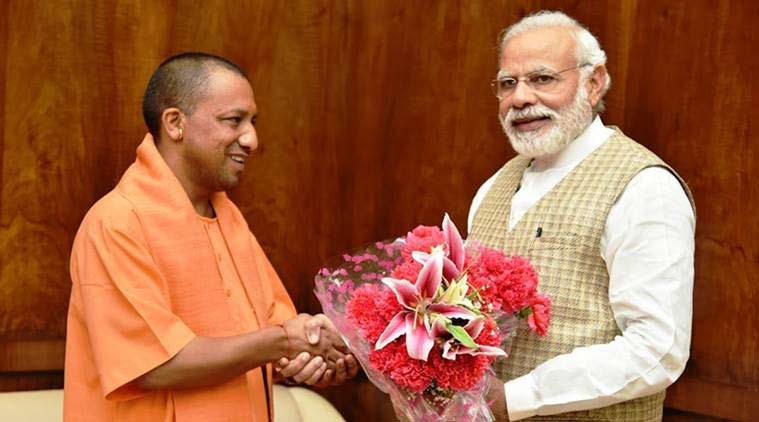BUSINESS
Why did Purvanchal get the attention in the Yogi government’s employment list

Prime Minister Narendra Modi on Friday launched the ‘Self-reliant Uttar Pradesh Employment Campaign’. A total of 31 districts of Purvanchal and Awadh regions have been included under this campaign. In this, industrial organizations will be included as partners to provide employment opportunities to workers.
Prime Minister Narendra Modi on Friday launched the ‘Self-reliant Uttar Pradesh Employment Campaign’. A total of 31 districts of Purvanchal and Awadh regions have been included under this campaign. In this, partnerships will be made with industrial organizations to provide employment opportunities to workers and to promote local enterprise. In such a situation, the question arises that why the districts of West UP have not been given place under poor welfare employment?
Under the self-sufficient Uttar Pradesh Rojgar Abhiyan, 32,300 gram panchayats of 31 districts of UP have been included. These include the same districts of Uttar Pradesh, where migrant laborers have returned more than 25 thousand during the Corona crisis. The districts have also been selected on the basis of this standard and only the districts under Purvanchal and Awadh region have been included in this list.
Districts under poor welfare employment
Under the employment campaign, Siddharthnagar, Prayagraj, Gonda, Maharajganj, Bahraich, Balrampur, Jaunpur, Hardoi, Azamgarh, Basti, Gorakhpur, Sultanpur, Kushinagar, Sant Kabir Nagar, Banda, Ambedkar Nagar, Sitapur, Varanasi, Ghazipur, Pratapgarh, Raibareli , Ayodhya, Deoria, Amethi, Lakhimpur Kheri, Unnao, Shravasti, Fatehpur, Mirjapur, Jalaun and Kaushambi.
Workers will get employment in these areas
Under this campaign, 25 types of works have been identified, in which migrants will be accommodated. For this, 1 dozen departments have been given responsibility. These include Rural Development, Panchayati Raj, Sakad Transport, Mining, Railways, Drinking Water and Sanitation, Environment and Forests, Petroleum and Natural Gas, Alternative Energy, Defense, Tele Communication and Agriculture Departments. Both the Center and the state will coordinate among themselves and will speed up employment campaigns in 31 districts.
Where did the workers return due to Corona
In fact, due to the Corona crisis and the lockdown, the most pressure of the migrants who have returned from other states of the country is in the districts of Purvanchal and Awadh. Already a victim of backwardness and agony, this additional work force in the districts of Purvanchal had increased the challenge for the government. Due to this, the Yogi government has made skill mapping of migrant workers at the district level. For example, where did the labor come from? What was his job there? Is that Skilled Labor or Unskilled? Which work is efficient? Interested in employment or not? In this way, the Yogi government has mapped more than 35 lakh workers in the state.
There are 10 districts including Gonda, Bahraich where more than one lakh people have come while in Jaunpur, Siddharthnagar and Azamgarh, this figure has crossed two lakh. At the same time, there are 15 districts where there are less than 1 lakh but more than 50 thousand migrants. Apart from this, there are 6 districts where more than 25 thousand workers have returned. In this way 31 districts were included under the self-sufficient Uttar Pradesh Rojgar Abhiyan.
Lack of big business in Purvanchal
In West UP, Ghaziabad, Noida and Greater Noida are major centers of employment, but in Awadh and Purvanchal such industries are negligible. Some districts have got sugar in the form of industry and there are employment related to agriculture industry. However, most of the sugar mills are closed, due to which the Yogi and Modi government have taken up the task of providing work at the local level by connecting them under the poor welfare employment scheme. Small scale industries and handicrafts can become important medium of local employment. Apart from this, MNREGA will become a major medium of employment.
More employment opportunities in the west
At the same time, there are more employment opportunities in the West, so the number of migrant workers returning from outside is much less than in the East. Ghaziabad, Baghpat, Hapur, Shamli, Mathura, Meerut, Gautam Budhanagar, Lalitpur, Moradabad, and Hathras are the districts of UP where less than 5000 workers have returned. West UP is also very prosperous in terms of business.
Ghaziabad and Gautam Budh Nagar are major centers of engineering and manufacturing units, while Meerut has all the units of sports, educational institute and MSME. In addition to tourism, Mathura produces sanitary-fittings tax and coax.
There is a big business of curtains, kitchen towels, table covers and cushions and printing bedsheets etc. in Hapur and Baghpat. In Shamli, RIM and Excel products get employment from zari and silk sarees in Lalitpur. There is a business of processing asafetida in Hathras and metal crafts in Moradabad. At the same time, there is a big glass bar in Firozabad. That is why special attention has been given to the districts of Purvanchal and Awadh under the self-sufficient Uttar Pradesh Employment Campaign.
